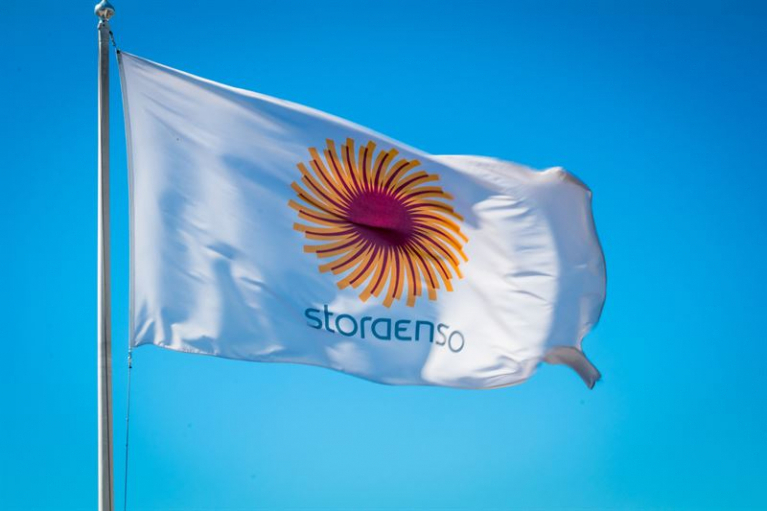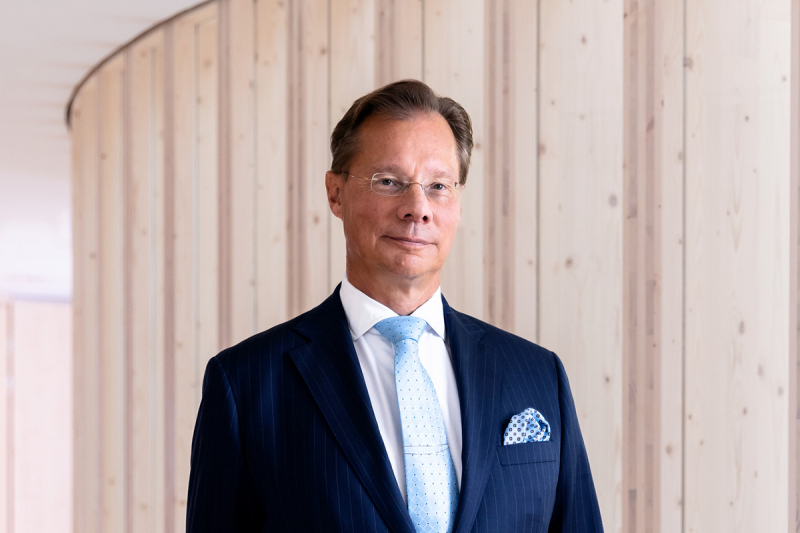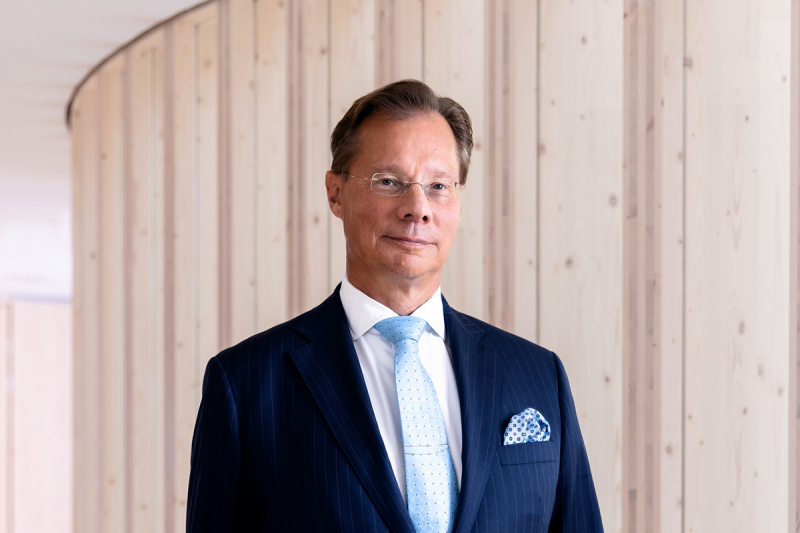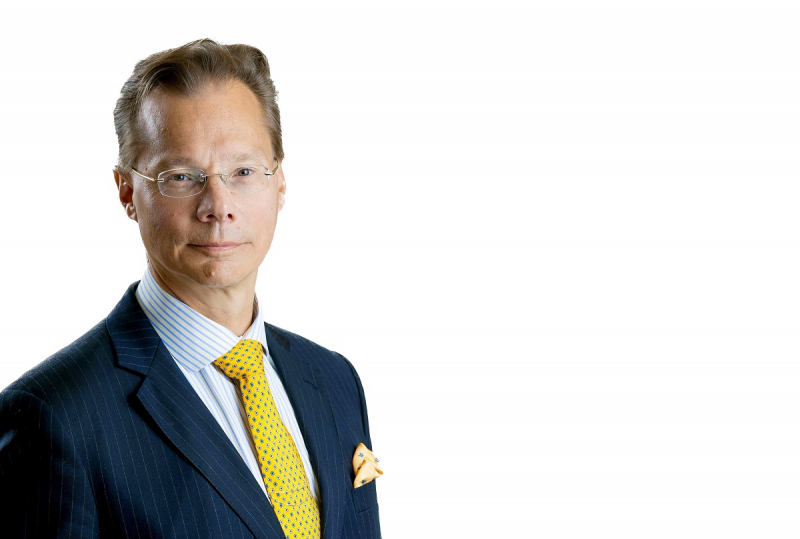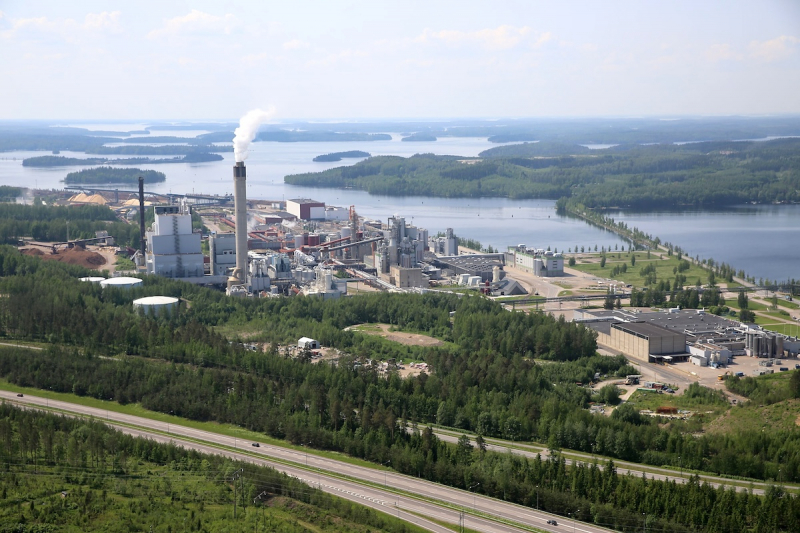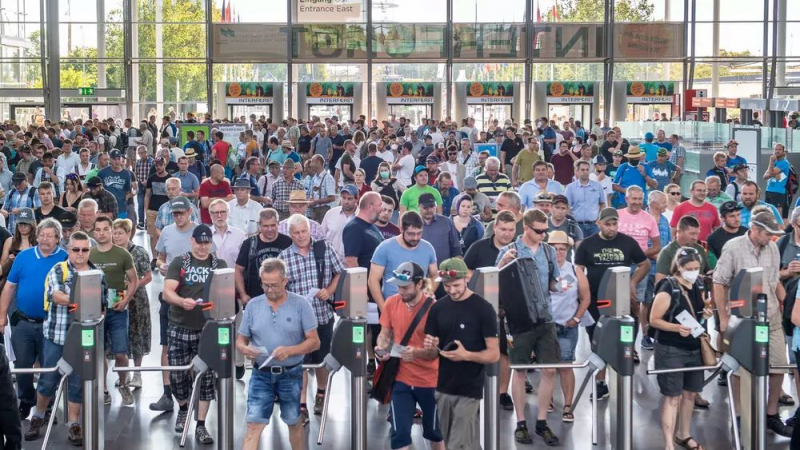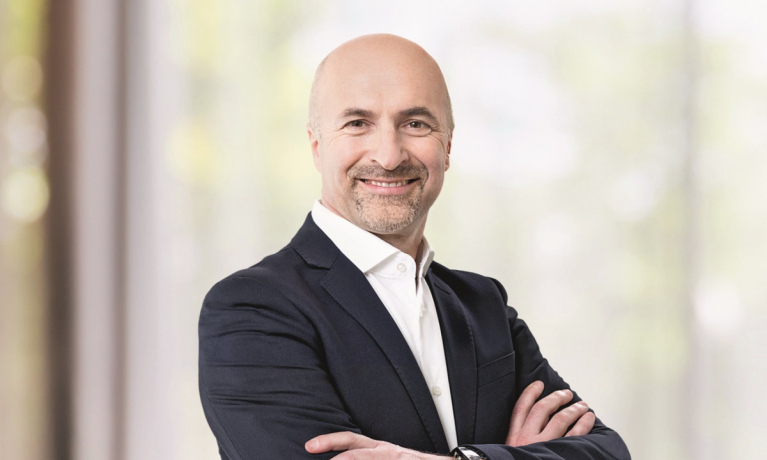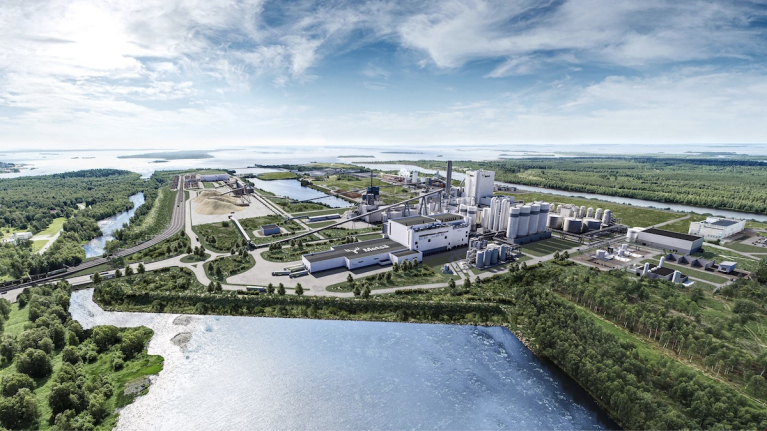Stora Enso Oyj Interim Report January-March 2024
Q1/2024 (year-on-year)
• Sales decreased by 20% to EUR 2,164 (2,721) million.
• Adjusted EBIT decreased to EUR 156 (234) million.
• Adjusted EBIT margin was 7.2% (8.6%).
• Operating result (IFRS) decreased to EUR 148 (258) million.
• EPS was EUR 0.11 (0.24) and EPS excl. fair valuations (FV) was EUR 0.09 (0.23).
• Cash flow from operations amounted to EUR 269 (254) million. Cash flow after investing activities was EUR -104 (1) million.
• Net debt increased by EUR 601 million to EUR 3,518 (2,917) million, mainly due to the board investment at the Oulu site.
• The net debt to adjusted EBITDA ratio (last 12 months) was 4.0 (1.3). The target is to keep the ratio below 2.0.
• Adjusted ROCE (last 12 months) excluding the Forest division decreased to 0.0% (16.5%), the target being above 13%.
Key highlights
• The profit improvement programme, initiated in the first quarter, has progressed well and the annual profit improvement target has been increased to EUR 120 million, from the initial EUR 80 million, driven by additional fixed cost reductions. The programme does not include site closures and may result in the reduction of approximately 1,000 employees.
• Operating working capital decreased by EUR 551 million year-on-year, driven by our continued focus to improve working capital efficiency.
• The consumer board investment at the Oulu site in Finland is progressing on schedule. Production is expected to start in the first half of 2025, with full capacity estimated to be reached during 2027.
• The plan to divest the Beihai site in China is proceeding according to plan. The site is classified as assets held for sale from the end of 2023 onwards.
Guidance
Stora Enso's full year 2024 adjusted EBIT is expected to be higher than for the full year 2023, EUR 342 million.
Outlook
Market outlook:
Stora Enso anticipates a gradual recovery in market conditions in 2024, with increased demand for consumer board, higher pulp demand and prices. However, profits are expected to be adversely impacted in the second quarter, mainly due to the sequentially higher maintenance costs in the quarter, higher wood costs, and the recent political strikes in Finland. Market uncertainties such as a continued high inflationary environment, strikes, demand and price development, and other external disruptions which may impact the Group’s profits, are expected to persist towards the end of the year.
Packaging Materials:
The Packaging Materials market has stabilised and orderbooks have improved, though the weak macroeconomy, including sluggish retail markets, is still slowing the recovery. Demand for consumer board is stable to positive, especially in liquid packaging board. Demand is expected to continue to recover in kraftliner and testliner, and announced price increases in the containerboard market are filtering through. For recycled board, demand has improved but underlying demand remains weak.
Packaging Solutions:
The Packaging Solutions division expects a stronger sequential demand in the second quarter due to seasonal effects. However, heavy overcapacity in the market, mainly in Eastern Europe, will continue to pose challenges, together with increasing containerboard prices.
Biomaterials:
The European demand is expected to slightly increase due to the ongoing Red Sea Crisis, which benefits board and paper producers in Europe. However, new capacities could impact the market later in the year.
Wood Products:
The Wood Products division continues to face challenges due to low demand, prices, volumes, and high wood costs. A seasonal demand improvement is expected in the classic sawn market during the second quarter of this year. The construction sector is still not improving.
Forest:
The Forest division expects a gradual rise in wood demand as markets in the second quarter remain tight in Finland, Sweden, and the Baltics. Wood prices are estimated to rise throughout the rest of 2024 in both Finland and Sweden.
Long-term growth opportunities:
Despite current challenges, Stora Enso sees long-term growth opportunities in sustainable packaging, wood construction, and innovative biomaterials. Regulations and sustainability megatrends support these developments.
Key figures
|
EUR million |
Q1/24 |
Q1/23 |
Change % Q1/24–Q1/23 |
Q4/23 |
Change % Q1/24–Q4/23 |
2023 |
|
Sales |
2,164 |
2,721 |
-20.5% |
2,174 |
-0.4% |
9,396 |
|
Adjusted EBITDA |
298 |
399 |
-25.3% |
212 |
40.3 % |
989 |
|
Adjusted EBIT |
156 |
234 |
-33.1% |
51 |
209.7% |
342 |
|
Adjusted EBIT margin |
7.2% |
8.6 % |
2.3% |
3.6% |
||
|
Operating result (IFRS) |
148 |
258 |
-42.4% |
-326 |
145.5% |
-322 |
|
Result before tax (IFRS) |
101 |
228 |
-55.6% |
-378 |
126.8% |
-49 |
|
Net result for the period (IFRS) |
84 |
185 |
-54.5% |
-325 |
125.9% |
-431 |
|
Forest assets1 |
8,626 |
8,269 |
4.3% |
8,731 |
-1.2% |
8,731 |
|
Adjusted return on capital employed (ROCE), LTM2 |
1.9% |
11.5% |
2.4% |
2.4% |
||
|
Adjusted ROCE excl. Forest division, LTM2 |
0.0% |
16.5% |
1.0% |
1.0% |
||
|
Earnings per share (EPS) excl. FV, EUR |
0.09 |
0.23 |
-60.6% |
-0.64 |
114.2% |
-0.73 |
|
EPS (basic), EUR |
0.11 |
0.24 |
-55.2% |
-0.36 |
129.6% |
-0.45 |
|
Net debt to LTM2 adjusted EBITDA ratio |
4.0 |
1.3 |
3.2 |
3.2 |
||
|
Average number of employees (FTE) |
19,412 |
21,144 |
-8.2% |
20,047 |
-3.2% |
20,822 |
1 Total forest assets value, including leased land and Stora Enso's share of Tornator.
2 LTM=Last 12 months
Stora Enso’s President and CEO Hans Sohlström comments on the first quarter 2024 results:

“In a continuous weak market, I am encouraged by Stora Enso's sequential financial performance improvement.
However, our year-on-year sales decreased by 20% to 2,164 million euro. Adjusted EBIT decreased to 156 million euro from 234 million in the same period last year, and the adjusted EBIT margin decreased to 7.2% from 8.6%. The political strikes in Finland had an adverse impact of approximately 25 million euro on our results. But we estimate the impact on our second quarter results to be lower. Net debt increased by 601 million euro to 3,518 million euro, due to the board investment at the Oulu site. We will continue our capital expenditure at 1.0 to 1.1 billion euro this year as this investment proceeds according to schedule, aiming to be back towards the average levels of 600 to 800 million euro per year from 2025.
The dividend of 0.10 euro per share was paid in April 2024. And the AGM authorised the Board of Directors to decide on a second dividend payment of up to 0.20 euro per share, no later than the fourth quarter this year.
A strong balance sheet is crucial for the future. Our net debt to adjusted EBITDA ratio was 4.0 in the first quarter. We recognise that this is higher than our target of remaining below 2.0 and are taking steps to manage our debt levels effectively and bring our ratio back in line with our target. Despite facing weak market conditions and making strategic investments, we were able to improve our cash flow by reducing our operating working capital. In fact, we were able to reduce it by 551 million euro compared to the previous year. We aim to release capital through working capital management and divestments to further reduce debt and increase liquidity, which remains strong.
Last year's poor performance emphasised the need for efficiency, decisiveness, and focus on essentials. We therefore launched a profit improvement programme this year, designed to strengthen our long-term competitiveness and financial sustainability. I am pleased to share that the programme is progressing well, and we have raised the potential improvement to 120 million euro annual adjusted EBIT from the initial target of 80 million euro. While we remain committed to our employees, the programme may result in the reduction of approximately 1,000 employees. Laying off people is a last resort, but it is necessary to improve our financial performance.
We have moved to a new, decentralised operating model and performance-driven organisation across the Group. We are building a culture centred around ambitious goal setting, agility, analytics, and accountability. This is linked to our expectations as an employer, and to the benefit of our customers and owners. Our commercial and operational excellence will benefit from a leaner approach where the responsibility for results is divided between divisions and business units to improve decision-making.
Our actions also focus on improving profitability through more efficient sourcing, production, and sales; freeing up capital, including working capital; strategy and execution; and ensuring we have the right people in the right jobs. The acquisition of De Jong Packaging Group and ongoing investment at our Oulu site support the Group's long-term strategy to build market share in renewable and circular packaging solutions that matter most to our customers.
Looking ahead, we anticipate a gradual recovery in 2024, with increased demand and higher prices for board and pulp. However, we anticipate adverse profit impacts in the second quarter due to higher maintenance costs and strikes in Finland. Cost inflation pressure has started to come down in general, but wood cost increases, especially on the Finnish market, continue to challenge profitability also this year. Ongoing market uncertainties, such as high inflation, demand and price development, and external disruptions, may persist throughout the year and could affect our profits.
While we face short-term challenges, we remain confident in our ability to focus on long-term growth opportunities in sustainable packaging, wood construction and innovative biomaterials.
Finally, I am pleased to report that we are on track and committed to meet our full year 2024 adjusted EBIT guidance to be higher than the full year 2023 adjusted EBIT of 342 million euro. And we are confident that our actions will build a more profitable, competitive, and valuable Stora Enso.”

